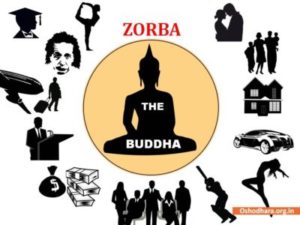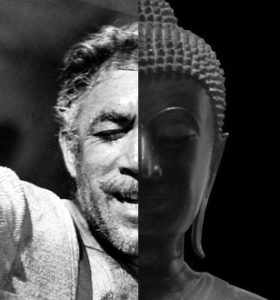But are they really opposites? Osho forcefully emphasises that they are just two sides of the same coin: unless we have lived the Zorba life, we can never really become a Buddha! Physical desires are natural, they are part of what makes us humans. There is no use in fighting them. If we try to suppress them, the temptation will only increase and we would live a troubled, repressed life, which is hardly the recipe to become a Buddha. In glorifying Buddha, we ignore his formative years as the Royal Prince Gautam: His father, in trying to charm him into the material life, gave him all pleasures one could ask for: 3 palaces for each season, the best of food and luxury, beautiful girls chosen from across the kingdom, all sick and old people banished from his sight etc. He lived this life till he was 29 and only then, after years of living the Zorba way, started to find it hollow. Even the best of times were no longer keeping him satisfied. As an intelligent man, he starts realizing the utter futility of it all. There was a yearning to know if this was all life had to offer. And then, when he sees death, sickness and old age, he decides to seek the ultimate truth. Leaves the comfort of the palace, meditates for 6 years and finally achieves enlightenment.
Osho asks whether Buddha could have achieved all this without first living the Zorba life? One has to personally experience, grow tired, and crave for the larger meaning. As Herman Hesse also remarked in his Nobel prize winning book (Siddhartha): None of Buddha’s followers, following the same golden path for thousands of years, have become a Buddha. Unless you have fully lived, how can you renounce life?
Osho goes one step further – saying Buddha, while enlightened, is incomplete. He is wise but is dry, there is no fun in him. Similarly, Zorba is incomplete too, because he lacks the vision, the sense of purpose of a Buddha. Hence, Osho puts up his idea of the perfect man: Zorba The Buddha. Enjoying this world, while not losing sight of the larger reality. Someone like Krishna, with his luxurious kingdom and 36000 wives, but also with the awareness to propound The Gita. Be in the world but not of the world. One integrated person – unsplit, whole, with the body of Zorba and the soul of Buddha.
Beyond this, Osho also talks of love (can possessiveness be called love?), independence, jealousy, beauty of silence, God and religion





 This information will never be shared with third party
This information will never be shared with third party
A must read book. See the book review by Mr. Nishant Saxena. 🙂
Beautifully encapsulated!
Love the concept of Zorba!
Nishant you spoke about this review but I only finally read it today. I think I will be efficient and not read it as I believe this is the P&G one pager equivalent for the book review and I will consider it MECE. Excellent stuff. Very profound.
Very insightful and informative